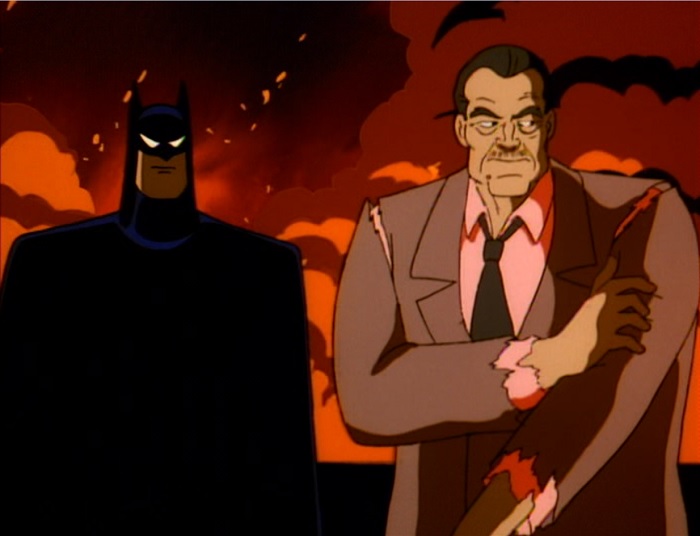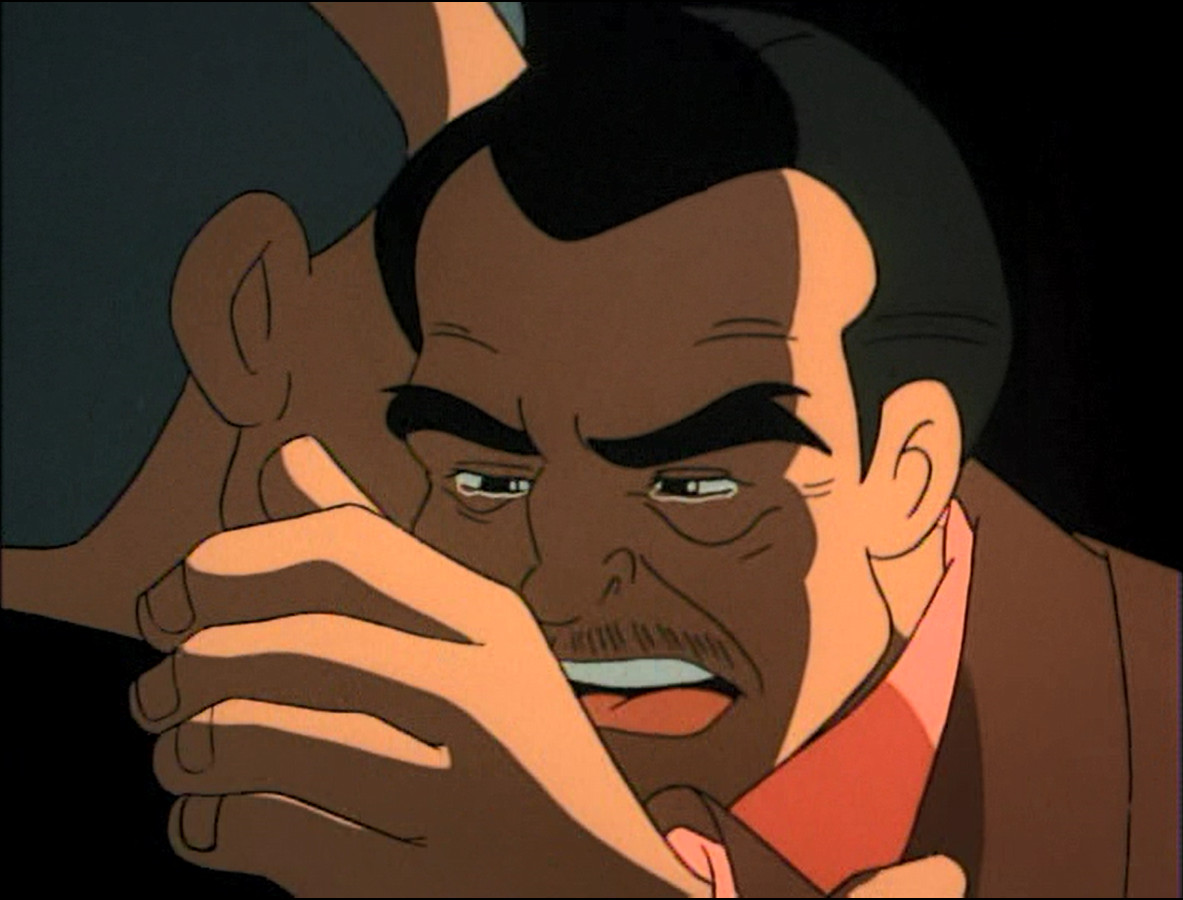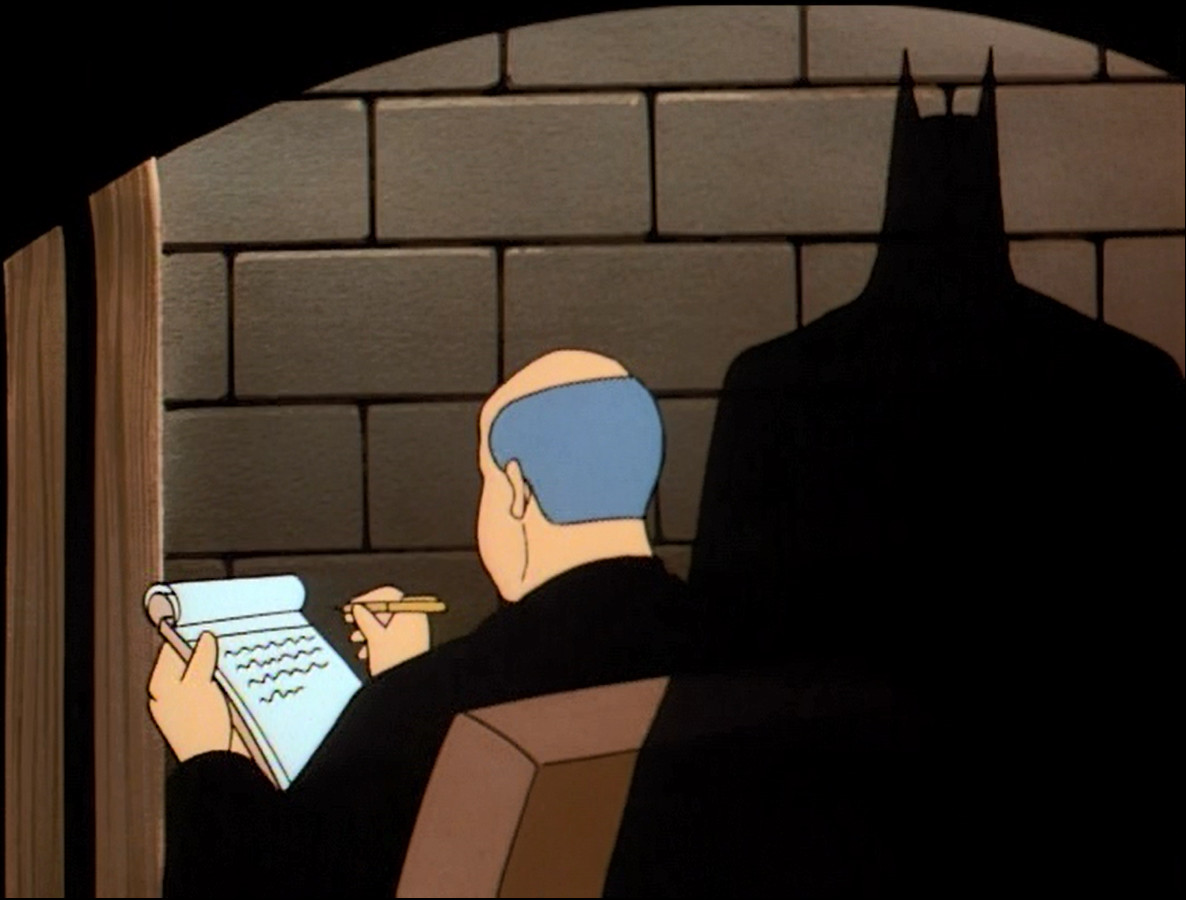It's Never Too Late | BTASpectacular
Richard Petro / 16 September, 2017

- Airdate: September 28, 1992
- Director: Boyd Kirkland
- Writer: Garin Wolf
Arnold Stromwell, Gotham’s reigning mob boss, is in the middle of a head-to-head with Rupert Thorne, one getting worse and worse. Arnold and his son, who has been missing for days, are estranged, but Stromwell is sure Thorne is behind it. Batman learns of a plan by Thorne to kill Stromwell during an upcoming meeting between the two. On his way to the meeting, Stromwell passes a rail yard where he experiences a flashback to himself as a child; Arnold, with another boy named Michael, argue as Arnold has stolen some candy. Walking home on the tracks, a train approaches and Michael dives out of the way, but Arnold’s shoe is stuck. He escapes and leaps out of the way, where he is faced by another train and freezes in fear. Stromwell arrives at the meeting while Batman meets with a priest to ask for help with Stromwell, the priest being familiar with him. At the meeting, Thorne, genuinely, does not know where Stromwell’s son is, and Stromwell realizes this is a setup once everyone quickly exit and a bomb goes off. Batman is able to save him and tells him to give up his ways, taking him to a few locations to convince him. Hearing that Batman has Stromwell, Thorne panics that he will be made to testify against all of his associates and demands his men to find the two. Batman takes Stronwell to his old neighborhood before taking him to a drug rehabilitation center, where Arnold finds his estranged wife and son, who is suffering from drug withdrawal. Stromwell is told by his wife that it was one of his dealers that got Joey addicted to drugs. Stromwell ends up breaking away from Batman, taking off with a gun and claiming he will save his son and deal with Thorne, whose gang attacks. Stromwell gets away as Thorne follows him and they end up on the railroad, where Stromwell has the rest of his flashback, showing that Michael pushed him out of the way of the train as it then goes by, Michael not seen. Stromwell drops, crying, repeating Michael’s name, and is comforted by the appearing priest, who happens to be Michael, Stromwell’s brother. The train accident led to him losing his leg and Arnold never forgave himself over the accident. Michael talks to Stromwell, and after some persuasion, telling him to do the right thing for his family, he agrees and the two embrace. Thorne appears with a gun, but Batman intercepts. The police arrive and Arnold is ready to give the a statement as Batman disappears into the night.
 Tackling another drama heavy episode right after, production wise, the Two-Face two-parter, It’s Never Too Late is an oft-forgotten episode that unfortunately never quite reaches the heights that it could. It’s still good, worthy of that underrated status that I believe it is, but because of that it is just a good episode that could have been great.
There are some very intriguing ideas and choices taken here. The idea to focus an episode on someone that isn’t an established/famous Batman character was a gutsy one, especially in a situation where Batman is very much a side character (the crew would have more success in stories with little Batman involved). The flashbacks we see of Stromwell as a child are really serious and heavy for a show meant for kids, as is the very open depiction/touching upon of drugs affecting teens, and seeing a child go through rehab. This is where we honestly hit the main problem of the story, though.
Tackling another drama heavy episode right after, production wise, the Two-Face two-parter, It’s Never Too Late is an oft-forgotten episode that unfortunately never quite reaches the heights that it could. It’s still good, worthy of that underrated status that I believe it is, but because of that it is just a good episode that could have been great.
There are some very intriguing ideas and choices taken here. The idea to focus an episode on someone that isn’t an established/famous Batman character was a gutsy one, especially in a situation where Batman is very much a side character (the crew would have more success in stories with little Batman involved). The flashbacks we see of Stromwell as a child are really serious and heavy for a show meant for kids, as is the very open depiction/touching upon of drugs affecting teens, and seeing a child go through rehab. This is where we honestly hit the main problem of the story, though.
The first half of the episode is incredibly well made; a wonderfully told straight-forward drama of someone dealing with PTSD and his past, along with him being confronted by how his actions and workings affect those he doesn’t or might not consider around him. The problem becomes the second half of the episode. What preceded it was told and presented in a very adult way, but there are moments later on that almost border on feeling very ‘PSA-ish’, the main example being how Stromwell is confronted by others’ words about the drugs affecting his son. There’s also an odd, conflicting feeling that they may have pulled back on how far they could have gone, specifically in the final scene where we learn that the other boy from Stromwell’s flashbacks didn’t die in the events, but did lose his leg. I was caught off-guard at the reveal that they were brothers, as I keep forgetting that plot point whenever I re-watch it, but the reveal that he was still alive feels… slightly odd. Don’t get me wrong, I’d rather not have kids in awful peril or be faced with death, but every once in a while, when done right, it can be ridiculously effective and not come off as manipulative. And it’s done that way here, especially since you don’t expect something of this caliber in a show that is, again, mostly started/meant for children. They do make you believe that such a tragedy had actually happened here and everything surrounding it feels so natural. I fully understand why they ended up making sure the brother was alive at the end, but it still feels slightly odd when it is revealed he’s from the flashbacks. That being said, the moment between the two brothers at the end is still great; a really well written and touching scene that seems very realistic in the way the two confront each other. I like that Michael’s a priest and still wants to help his brother, though he knows that Stromwell needs to want help to be able to properly lend a hand, and the way he talks down a guilt-ridden Stromwell, with heart and humour, feels real.
 The film noir atmosphere BTAS has works especially well in stories like these. The use of shadows and camera angles always complement the gangster-mob stories and scenarios incredibly. There are also a few neat touches the creators took here. They don’t immediately reveal Bruce in disguise in the diner, instead presenting him as just another patron that is told to leave. It’s simple but that’s the kind of small detail that I always loved about the series. The moment where Batman saves Stromwell in the same diner is executed in a wonderful, quick way, with Stromwell locked in the dark until he, and we, get only a split second view of Batman appearing in the room with him before the explosion.
The film noir atmosphere BTAS has works especially well in stories like these. The use of shadows and camera angles always complement the gangster-mob stories and scenarios incredibly. There are also a few neat touches the creators took here. They don’t immediately reveal Bruce in disguise in the diner, instead presenting him as just another patron that is told to leave. It’s simple but that’s the kind of small detail that I always loved about the series. The moment where Batman saves Stromwell in the same diner is executed in a wonderful, quick way, with Stromwell locked in the dark until he, and we, get only a split second view of Batman appearing in the room with him before the explosion.
Even with the hopes that the episode would go all the way with what it set up, and the slight PSA feel of a line or two, the episode is still effectively told. It covers subject matter you wouldn’t expect in a show like this at the time, and from a really interesting point of view. Though I do feel that the appreciation of the episode is there more once you get older, as anyone younger watching may not be as enticed considering it doesn’t involve an established villain, nor does it involve the Dark Knight as directly as others. I definitely recommend revisiting it if you haven’t seen it in a long time, or giving it a viewing if you haven’t seen it at all.


